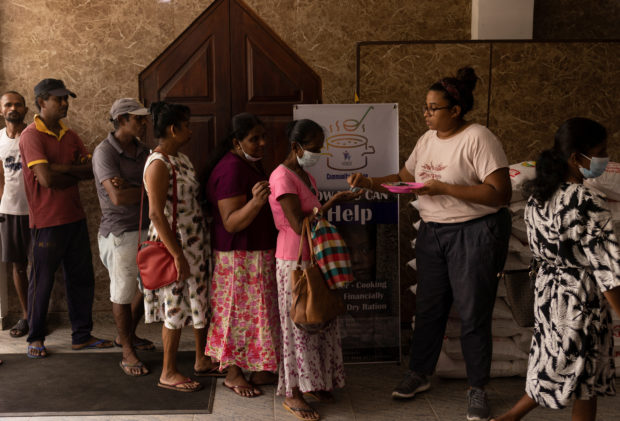UN issues dire warning of food insecurity in Sri Lanka

Aru de Silva, 36, a volunteer, distributes tokens for free food inside a community kitchen at a church, amid the country’s economic crisis, in Colombo, Sri Lanka, July 25, 2022. REUTERS
COLOMBO — Close on the heels of Agriculture Minister Mahinda Amaraweera’s admission that the government lacked the wherewithal to purchase paddy, the Food and Agriculture Organization (FAO) of the United Nations and its World Food Program (WFP) has, in a joint report released yesterday (Sept. 12), revealed that 6.3 million people are facing moderate to severe acute food insecurity.
The report released in Rome and Colombo simultaneously warn that the situation is expected to worsen unless adequate life-saving assistance and livelihood support are provided.
UN agencies have said two consecutive seasons of poor harvests, which led to a nearly 50 percent drop in agricultural production, and reduced imports of food grains due to foreign exchange constraints have caused the present situation.
The joint FAO-WFP Crop and Food Security Assessment Mission (CFSAM) noted that immediate food assistance and livelihood programs, including through existing social assistance mechanisms, are critical to enable households to access nutritious food, particularly moderately and severely acute food insecure ones.
Without assistance, the food security situation is expected to deteriorate further, particularly during the October 2022 to February 2023 lean season, driven by poor harvests of staple foods, in particular rice, and the ongoing economic crisis.
Article continues after this advertisement“In order to avert a further deterioration of food security conditions and to support restoration of agricultural production, livelihood assistance targeting smallholder farmers should remain a priority,” said FAO Representative in Sri Lanka Vimlendra Sharan. “With around 30 percent of the population depending on agriculture, improving the production capacity of farmers will ultimately boost the resilience of the agricultural sector, reduce import requirements amid shortages of foreign currency reserves and avert the rise in hunger.”
Article continues after this advertisement“Months into this crippling economic crisis, families are running out of options – they are exhausted. More than 60 percent of families are eating less, and eating cheaper, less nutritious food. This comes at a time when financial constraints have forced the government to scale back on nutrition programs, such as school meals and fortified food to mothers and undernourished children. WFP’s top priority is to provide immediate food and nutrition assistance to the most at-risk communities to prevent a further deterioration of their nutrition,” said WFP Representative and Country Director in Sri Lanka, Abdur Rahim Siddiqui.
At the request of the Government, the joint Crop and Food Security Assessment Mission visited all 25 districts in the country between June and July 2022 to analyze agricultural production levels in 2022, particularly of main staple cereals, as well as to assess household food security conditions.
RELATED STORIES
‘Impossible situation’ for Sri Lankans struggling for petrol
Sri Lanka repays debtors as citizens go hungry